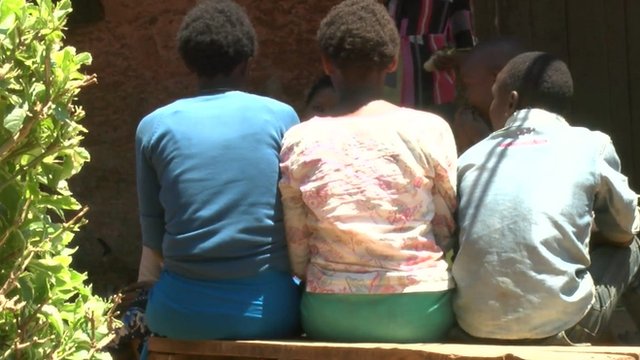Once, at church in Enugu, a woman had her help – this girl could not have been much older than 6- running after her 3 children, the oldest of whom was a bratty boy older than the girl and the youngest was maybe 2. It was easy to tell this kid was the maid because she did not have ribbons in her hair like the other 2 girls and her ‘Sunday dress’ was a washed-out T-shirt over a skirt. She was in charge of doling out snacks and water to the children but I never saw her eat or drink once. Apparently, she was not allowed to. Services in Enugu churches are notoriously long and churches fill up quickly , so latecomers (like me and this woman) end up sitting outside. She did not want to be bothered by her children and had them sit beside the help rather than with her. Each time any of them came to “disturb” her, the girl got a warning to keep the child away. It was painful to witness.
According to Nigeria’s Trafficking in Persons (Prohibition) Law Enforcement and Administration Act, 2003, as amended in 2015, it is a crime to use minors as house help. Section 23 (1)(a) states: “Any person who employs, requires, recruits, transports, harbours, receives or hires out a child under the age of 12 years as a domestic worker, commits an offence and is liable on conviction to imprisonment for a minimum term of 6 months and not exceeding 7 years.” Story! I’m not even sure many of us know that this law exists. The only time that this law is invoked is in conversations around well publicized cases of domestic help abuse. Sadly, these cases abound. On the 9th of this month, a Twitter user, @obiano posted a photograph of a bruised and bleeding child who looked utterly stupefied. According to @obaino, the child was a house help whose master had thrown off the balcony of the 2nd floor of a 2 storey building. In September of 2020, it was the story of an 8 year old help whose employer intentionally scalded for having the temerity to try some of the baby formula meant for the infant under her care that got some level of publicity. In October, it was the one of the help who was beaten and chained outside the house like a dog by her employers for stealing sweeties. In July, it was the video of a woman who lifted her young help from the back of her car and body-slammed her to the ground. Sometimes, thankfully, some of these cases end up with the criminals being apprehended. Last year, Enugu police arrested a couple who branded their 10 year old help with a pressing iron and allegedly drilled two nails into her head.
As reported by the International Labour Organization (ILO), Nigeria has about 15 million children under the age of 14 working across the country. We know that given the population of Nigeria and the preponderance of young domestic workers in many of our homes, that the number is most likely higher than estimated. These young people- mostly girls- are living with us, with our families, with our friends. While the most horrendous cases get the social media treatment and we all (rightfully) are appalled by the cruelty of these abusers, we should be equally horrified by the way the ones in our own vicinity are treated and by how much of the abuse we have accepted as normal.
A friend went to Nigeria for a short break and stayed with a cousin of hers who relocated from the UK. This cousin and his wife seemed to be doing very well, better than they were doing in the UK. Both had good jobs, a beautiful home with marble flooring all through , a stand by generator so that the air conditioners never had to go off. In the middle of the night when my friend went to the kitchen to get water, she was shocked to find the young house girl whose cooking she had praised earlier that day, curled up on the cold floor sleeping, a wrapper covering her. Apparently, letting her sleep in a room, on a bed, was too much luxury which might turn her head and prevent her from doing her duties diligently. My friend had words with her guests – and we know the thing with words- and no longer speaks to them. “These people were decent folks, so I don’t know what happened,” she told me.
And that is precisely the case. In many cases, these children are not living with murderous sadists who throw them off balconies or drill nails into their heads or body-slam them into the ground. They live with “decent people” who do not recognize these children as children or as people worthy of being treated well. Many of these kids come from poor homes and do not have anyone to advocate for them. “Decent” people take them in but do not feed them well, do not send them to school, do not let them have access to anything that might help them grow. In some families, they eat only after everyone else has eaten or are forced to eat a different meal from the rest of the family. While the children of the house get an education, these servants, dressed in tattered clothes, fetch and cook and clean all day. They are not allowed to watch TV, to sit in the parlour, to forget for one minute that they are there to serve. They are the first to wake up and the last to go to bed. They are woken up from naps because how dare they nap? They are beaten for every little infraction. They are shouted at all day to do this, do that, do the other thing.
This has got to stop. There is absolutely no reason to take in someone’s child and not treat them like you would treat one of yours. And if it is help you need, employ an adult and pay them a living wage. End of.

 Join Daily Trust WhatsApp Community For Quick Access To News and Happenings Around You.
Join Daily Trust WhatsApp Community For Quick Access To News and Happenings Around You.


